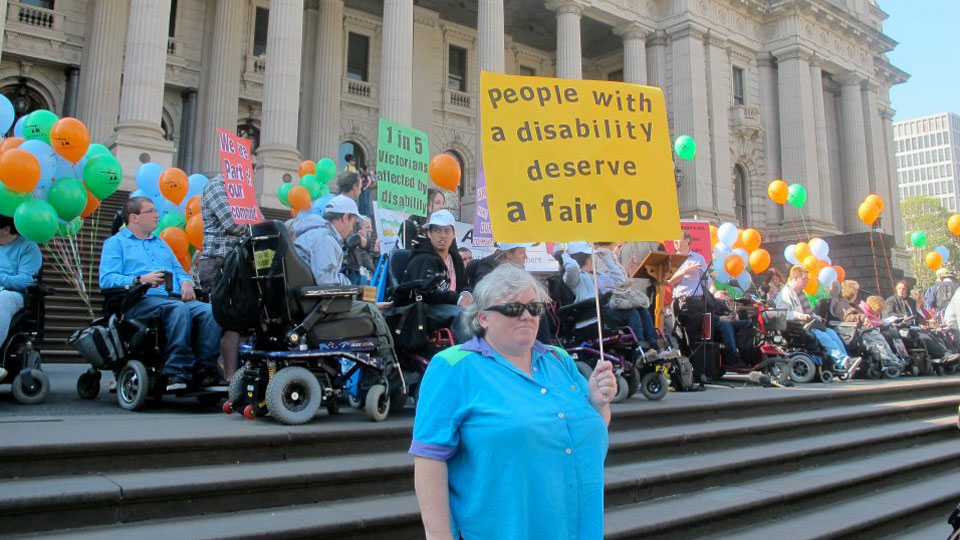Choice and Control Under Threat: Victoria must listen to people with disability and stay true to the principles of the NDIS

There are a few examples of this, but let’s highlight one that particularly worries us. The Victorian government recently announced it wants to introduce a Registration and Accreditation Scheme. In simple terms, this means appointing a regulator to decide who can be a disability support worker. We are worried that this will take control away from people with disabilities and put at risk the principles of choice and control that we have fought so hard to achieve. A regulator can prevent people from working if that worker does not have a specific qualification. They can also require workers to be registered, removing the current flexibility that people with disabilities have to choose workers suitable to our specific needs.
Some people may want to choose a registered and accredited worker – we know that would benefit some people. We think the scheme should therefore be voluntary. If the scheme is made compulsory it will derail the NDIS from its core purpose which was to shift control from government and service providers to people with disabilities. In its recent report the Productivity Commission made it very clear –
“This scheme is for people with disability, not for service providers. Not for governments, not for empires or private agendas. This scheme is for people who are as individual as their fingerprints.”
Our individuality must not be forgotten and our right to choice and control must remain front and centre. We were promised a scheme that would bring an end to the old system where decisions about us were made by others. We campaigned hard and over many years to have our basic human rights finally recognised by government. In 2012 the NDIS Act enshrined in its principles the right to choice and control and the right to make decisions about our supports. We should not be having to make the case again.
As people with disabilities who depend on others for our basic needs, it is our right to decide who comes into our homes, who we have in our lives, and who touches our bodies. To put it bluntly, it is for the person with disability to decide who wipes their butt – not a bureaucrat.
We are not alone in our views. A new advocacy group, Action for Choice and Control has formed and in less than a week, over a thousand people with disabilities and our families signed a petition that calls on the Victorian government to protect choice and control by making the proposed Registration and Accreditation Scheme voluntary. Some of the reasons we oppose a compulsory Registration and Accreditation Scheme include:
- People with disabilities are diverse, and the need and preference for workers with a disability qualification applies to some but not all of us.
- There are many excellent support workers who will leave because they cannot afford the time or money to undertake a formal disability qualification. Formal disability qualifications can take many months or years to complete and cost thousands of dollars, and have generally been found to be poor quality.
- For many of us, an individual’s attitudes, values and shared interests are far more important than a formal qualification or accreditation.
- We need to double the workforce to meet demand under the NDIS. It is hard enough to find good workers, we don’t need the government to make it even harder for us to find and keep support workers.
- Abuse and violence against people with disabilities is more likely when people with disabilities do not have choice about who supports us.
- People who are in rural and regional areas, Aboriginal, Culturally and Linguistically Diverse background or LGBTIQ will find it harder to access appropriate workers.
- People with an intellectual disability may not be able to complete a certificate level qualification, imposing additional barriers to their employment as a support worker.
- Young people often choose to work with their peers who are unlikely to have a disability qualification. Engaging peers as support workers is highly desirable for young people with disabilities and enables them to take part in age-appropriate pursuits.
- The NDIS is meant to be a national scheme, a scheme that is consistent across Australia. Victoria agreed to a national scheme and this sets a precedent for other states to also establish their own rules, taking us back to a fragmented system where your place of residence will determine your support.
- Nationally, the NDIS is establishing a $209 million National Quality and Safeguards Commission, we do not need a duplication of bureaucracies in every state eating up scarce resources that could be better spent paying for much-needed housing and support.
The Victorian government is currently undertaking a consultation about the proposed changes. If you want to have your say you can email your views to
You can read a copy of the Victorian government’s consultation paper here: https://engage.vic.gov.au/registrationandaccreditation
If you want to learn more about the advocacy group you can check us out here: https://www.facebook.com/actionforchoiceandcontrol/


Join the conversation